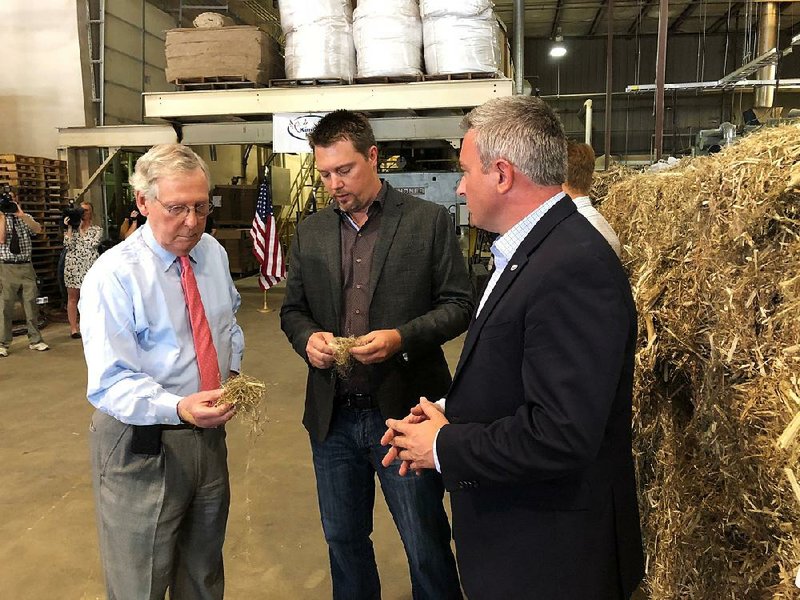Democrats and Republicans said they reached a tentative deal on farm legislation after jettisoning work requirements for food-stamp recipients demanded by President Donald Trump and conservatives in the House.
Lawmakers said Thursday that they expect both chambers to take up the $400 billion farm bill as soon as next week after House-Senate negotiators resolved differences between their versions of the agriculture measures. The bill would renew farm subsidies, federal crop insurance and food aid for low-income families for five years.
House Agriculture Chairman Mike Conaway, R-Texas, and Senate Agriculture Chairman Pat Roberts, R-Kan., along with the top Democrats on the panels, said they reached a tentative deal without detailing all the provisions. Farm programs under current law began to expire Sept. 30.
"The certainty that the farm bill brings to the table for the next five years is the win," Conaway said.
The biggest stumbling block in the debate over the farm bill, HR2, has been over expanding work requirements for many people who receive food stamps. House Republicans had proposed making older food-stamp recipients and those with children age 6 and older comply with work requirements, while Senate negotiators opposed those changes.
The House provisions were left out of the final bill, according to Roberts. He said the bill strengthens existing work requirements without adding new ones and without shifting food-stamp funding into job training.
"It's more the Senate version than the House version," Conaway said, adding that the bill will include more provisions to root out food-stamp fraud. "Everything we had in the House bill was important but we made the compromises we needed to get this deal done."
Another snag resolved by negotiators was a push by Agriculture Secretary Sonny Perdue and Interior Secretary Ryan Zinke to enact more permissive logging regulations. Roberts said the compromise involves easing the ability of loggers to salvage wood from fire-damaged areas.
Minor changes may be made once the nonpartisan Congressional Budget Office evaluates the bill's effect on the deficit. Lawmakers said the final version will be made public next week. Roberts said the deal hasn't yet been presented to Trump.
Collin Peterson of Minnesota, the top Democrat on the House Agriculture Committee, predicted the bill would get strong support from lawmakers in his party.
Conservatives indicated displeasure. Asked what he thought about the farm bill, Rep. Ted Yoho, R-Fla., said "not much" when he left a briefing on the agreement.
In September, Trump tweeted: "Pass the Farm Bill with SNAP work requirements!" SNAP refers to the Supplemental Nutrition Assistance Program, formerly known as food stamps.
Liberal groups have vehemently opposed the proposed restrictions on food stamps, which they say are needed for people in poverty. Between 800,000 and 1.1 million households would have faced food benefit cuts under one of the House Republican proposals, according to a study by the Mathematica Policy Research, a policy research organization.
The bill doesn't include a provision championed by Sen. Charles Grassley, R-Iowa, aimed at preventing wealthy absentee landlords from collecting farm subsidies.
"You are going to have Wall Street bankers getting subsidies who aren't actively engaged in the business of farming, they don't have dirt under their fingernails," he said.
The bill includes a provision that would make hemp a legal agricultural commodity after Senate Majority Leader Mitch McConnell of Kentucky championed the proposal, even joining the farm bill conference committee to ensure it would be incorporated. Among other changes to existing law, hemp will be removed from the federal list of controlled substances and hemp farmers will be able to apply for crop insurance.
McConnell has guaranteed that his proposal to make hemp a legal agricultural commodity, removing it from the federal list of controlled substances, will be part of the final farm bill, a crucial measure for rural America and Kentucky, where the Republican senator faces re-election in 2020. He places it on a par with federal spending bills as action Congress must take before the end of the year.
Keeping that promise would cap a decadeslong journey to overcome the stigma associated with the crop, which McConnell himself did not initially embrace wholeheartedly. But in recent years, the quintessential establishment Republican has been all in for the hemp revolution.
The crop was historically used for rope but has many other uses, including clothing and mulch from the fiber; hemp milk and cooking oil from the seeds; and soap and lotions. Other uses include building materials, animal bedding and biofuels. Hemp-derived cannabidiol, or CBD oil, as a health product has become an increasingly large market.
Hemp's comeback started with the 2014 federal farm bill. McConnell helped push for a provision allowing states to pursue hemp research and development. That allowed the crop to be grown on an experimental basis.
Information for his article was contributed by Teaganne Finn, Erik Wasson and Daniel Flatley of Bloomberg News; by Jeff Stein of The Washington Post; and by Bruce Schreiner of The Associated Press.
Business on 11/30/2018
